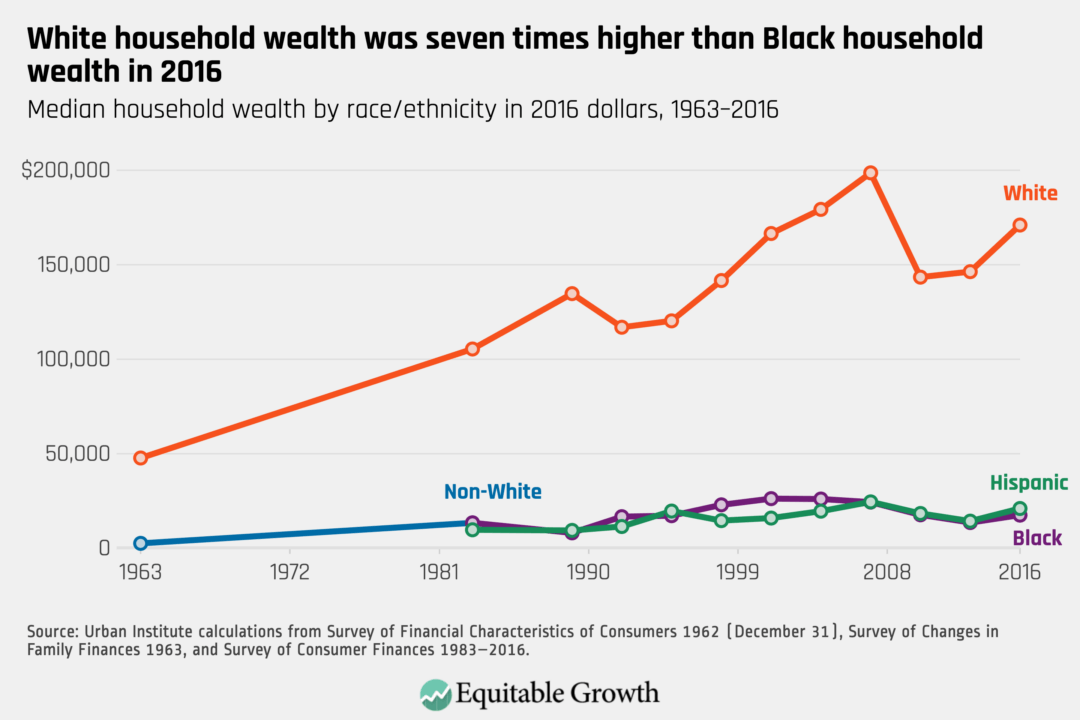Weekend reading: Racial economic inequality and Juneteenth edition
This is a post we publish each Friday with links to articles that touch on economic inequality and growth. The first section is a round-up of what Equitable Growth published this week and the second is relevant and interesting articles we’re highlighting from elsewhere. We won’t be the first to share these articles, but we hope by taking a look back at the whole week, we can put them in context.
Equitable Growth round-up
Today is Juneteenth, the day that commemorates Black Americans’ emancipation from slavery in the United States in 1865. In any given year, this day is typically a celebration of freedom, resilience, and endurance. In 2020, the 155th anniversary of Juneteenth, the day is also a harsh reminder of the inequities that communities of color experience in the United States, as the country and the world face social unrest and protests against systemic racism and police brutality. Liz Hipple, Shanteal Lake, and Maria Monroe pull together eight graphics that highlight the deep economic disparities between Black and White communities, particularly with regard to wages, wealth, and health. These racial divides are all the more significant as a result of the coronavirus pandemic and recession. Hipple, Lake, and Monroe make several evidence-backed policy suggestions that would address the racial inequality so deeply embedded in U.XS. society, the economy, and institutions—including policies focusing on wealth building and closing the racial wealth divide, reversing racist differences in credit options, and addressing racism in the criminal justice system. They also provide a list of scholars to follow for more in-depth reading on these issues.
This week, Heather Boushey—along with former Fed Chair Ben Bernanke and Cecilia Rouse, dean of the Woodrow Wilson School of Public and International Affairs at Princeton University—led a group of more than 150 economists urging Congress to pass additional stimulus legislation in the face of the coronavirus recession. Among other demands, the scholars implore legislators to provide continued support for the unemployed, assistance to state and local governments, investments to preserve employer-employee relationships, and aid to stabilize aggregate demand. The group includes two former Fed chairs, four former chairs of the Council of Economic Advisors, and two Nobel laureates, among others.
Brad DeLong highlights several important articles from Equitable Growth and around the web in his latest installment of Worthy Reads.
Links from around the web
Juneteenth’s century-and-a-half history holds a lot of meaning in today’s fight for Black liberation, whether through protests against systemic racism or in calls to abolish or defund the police, writes Fabiola Cineas for Vox. Cineas walks through a history of the holiday, how people have commemorated the day over the years since 1865, and Juneteenth’s particular significance this year “as an opportunity for the United States to come to terms with how slavery continues to affect the lives of all Americans today.” It’s helpful background for those who may not know much about or who misunderstand the holiday—in large part, Cineas explains, because it is not often taught in schools. Perhaps if it were (along with improved teaching of racial oppression in America), the long history of racism and racial inequality in this country would be better understood by more of the U.S. public.
The coronavirus pandemic is ravaging our economy because it was already broken when the recession hit, writes Eric Levitz in New York Magazine. Inequality’s decades-long growth, made possible by policies to diminish the power of unions and lower taxes on the rich, reshaped the economy to be top-heavy and cater to the wealthy—and now, the wealthy aren’t spending their money, which means the economy can’t fully recover. “If more of America’s economic activity were geared toward meeting the needs of the median worker—and less toward serving the whims of the typical banker—then the pandemic-induced collapse in high-end consumption would have brought fewer jobs down with it,” explains Levitz. Likewise, he continues, if wages had been able to keep up with productivity gains, then the economy would have been bigger, with fewer financially vulnerable workers. While the coronavirus would have certainly caused economic difficulties regardless of our economy’s structure, deep and persistent inequality has made the recession worse—and likely will prolong the pain and delay the recovery.
Not only does the coronavirus worsen inequality in the United States, it could also widen the racial wealth divide by expanding the homeownership gap between Black and White Americans. Michelle Singletary explores the game-changing effect of owning a home for wealth and financial well-being, particularly for Black families, in The Washington Post. The disparities in homeownership rates began long before the coronavirus arrived on our shores, she writes, due to racist and discriminatory practices in the real estate industry, redlining, and access to credit. But the pandemic is certainly contributing to it. In fact, the rate of black homeownership is near the same level today as it was before anti-discrimination policies in housing came into effect in the 1960s.
Friday figure

Figure is from Equitable Growth’s “Reconsidering progress this Juneteenth: Eight graphics that underscore the economic racial inequality Black Americans face in the United States” by Liz Hipple, Shanteal Lake, and Maria Monroe.

